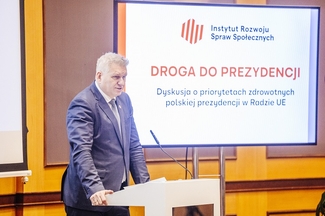Pobierz materiał i Publikuj za darmo
The path towards achieving the EU goal of net zero emissions by 2050 is one of the main themes of the Territoriall quarterly's latest issue prepared by the European research programme ESPON. Its authors demonstrate that the different pace of the energy transition in individual regions primarily results from the need to ensure the safety of, and sense of justice to, local communities.
The experts behind the Territoriall magazine presented the process of reducing the share of coal in favour of gas and renewable energy sources in regions in the energy mix of individual European countries, including the Czech Republic and Germany. Data analysis demonstrates that the paths leading to complete decarbonisation considerably differ across locations due to the specificities of individual regions, historical events and economic potential of each country.
In the Czech Republic most electric energy, about 37 percent, is produced from coal. Nuclear power plants make for 33.6 percent of the Czech energy mix, gas - about 11 percent, and RES - almost 10 percent. The Czech Republic currently has 26 lignite-fired plants with a total installed capacity of over 100 MW, of which seven are among the 10 companies emitting the most carbon dioxide. Another problem involves power plants polluting the air with mercury. The largest facility of this kind, located near the border with Germany, does not meet the EU standards in this respect, but the regional authorities have granted it an exemption from EU limits for a further four years.
The programme to move away from coal production in the Czech Republic is being created under the government’s coal commission which brings together the representatives of various ministries, local and regional governments, employers and unionists. The most probable date for completing decarbonisation in the Czech Republic is 2038, although some environmental organisations would like to see it achieved by 2033. The later date is more probable due to the delays in the process of expanding the nuclear power system and the uncertainty as to the directions of EU policy towards gas. It is largely the latter resource that the Czech government has decided on as a substitute for coal and the necessary backing for the development of RES.
2038 is also the date of shutting down the last coal-fired power plants in German. The federal government, along with the regional authorities, has negotiated a deal with the operators of mines and power plants, regulating the schedule of shutting down plants and issues of financial compensation. For the power units owned by RWE and LEAG to be put out of operation by 2029, the corporations will receive a total of EUR 4.35 billion. The operators of plants to be shut down after that date will receive no compensation. The schedule assumes that lignite-powered plants with a total power of 6 GW will be allowed to operate up until 2038. The details of the deal were received with doubts by the European Commission and are currently being verified for their compliance with EU law on state aid.
The German government has allocated the record-breaking amount of EUR 40 billion for the restructuring of coal regions, but low public acceptance for shutting down mining and production remains a problem, particularly in former East Germany, which is still clearly lagging behind and poorer than the western states. German people expressed their doubts at the September federal elections. In most coal regions located in the east, especially in Saxony, the winning party was Alternative for Germany, which calls into question the EU’s climate policy, among other things.
The Polish perspective on the issue of achieving climate goals was presented by Marta Koreniecka from the University of Białystok. The expert reminded that Poland is one of the two remaining Member States which still mine lignite, although the scale of operations is consistently decreasing. However, she emphasised that the key aspect and challenge is to persuade the residents of regions that will face those revolutionary changes. Without public acceptance, as evidenced by the German and Czech experience, the success of the Green Deal as a whole may be doubtful.
“Decarbonisation is already happening and we should approach it in a reasonable way, considering the interests of local communities, concern over thousands of jobs and the energy safety of the country at large. None of the countries which had been focused on mining and began moving away from coal has handled this change in a satisfactory manner. The resulting wounds still bleed in England and France, and these are wealthy western countries. We can learn from their experience to avoid their mistakes and take advantage of the good ideas,” wrote Marta Koreniecka.
She also reminded the readers that changes in mining must be accompanied by a thorough modernisation of the whole fuel and power system and numerous investments in low-emission power and heat generation technologies, as well as universal thermal modernisation of buildings. She mentioned Upper Silesia as an example of a successful transition stretched over a long period. Unused and often degraded mining areas are converted there into economically profitable projects, such as photovoltaic systems or small-scale wind farms, which preserve jobs and create opportunities for protecting the historic industrial architecture.
“The years 2030 and 2050 set the time frame for implementing the assumptions of the European Green Deal. In that time the Just Transition Fund will provide EUR 17.5 billion worth in current prices for alleviating the social and economic effects of decarbonisation,” wrote ESPON director Wiktor Szydarowski in the latest issue of Territoriall.
It is the international ESPON programme run by the Polish academic that provides European institutions with information regarding the diversity of regions forming part of the Community and its Associated Countries. This data allows us to adapt our current Community projects to the actual needs and expectations of specific areas and communities.
“The ways of implementing this goal differ materially in individual regions and may have considerable socio-economic consequences. Due to this, the current uncertainty must be translated into regional strategies in which the political decision-makers at all stages of territorial governance will work on methods to conduct a just transition,” said Wiktor Szydarowski.
The latest issue of the Territoriall magazine is available on the ESPON website.
Source: PAP MediaRoom
Pobierz materiał i Publikuj za darmo
bezpośredni link do materiału
| Data publikacji | 25.10.2021, 14:15 |
| Źródło informacji | PAP MediaRoom |
| Zastrzeżenie | Za materiał opublikowany w serwisie PAP MediaRoom odpowiedzialność ponosi – z zastrzeżeniem postanowień art. 42 ust. 2 ustawy prawo prasowe – jego nadawca, wskazany każdorazowo jako „źródło informacji”. Informacje podpisane źródłem „PAP MediaRoom” są opracowywane przez dziennikarzy PAP we współpracy z firmami lub instytucjami – w ramach umów na obsługę medialną. Wszystkie materiały opublikowane w serwisie PAP MediaRoom mogą być bezpłatnie wykorzystywane przez media. |






